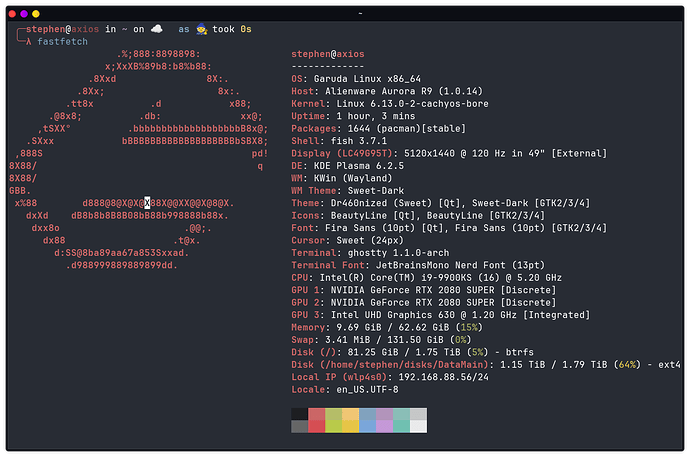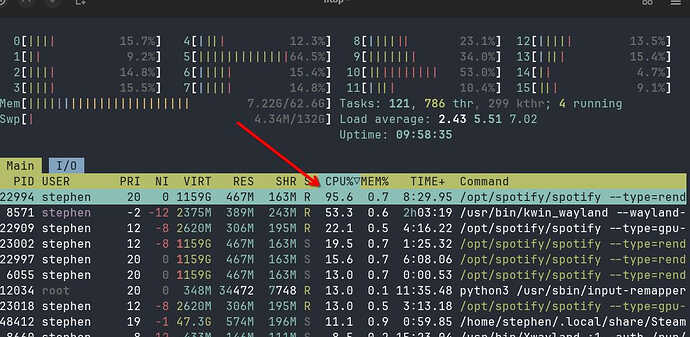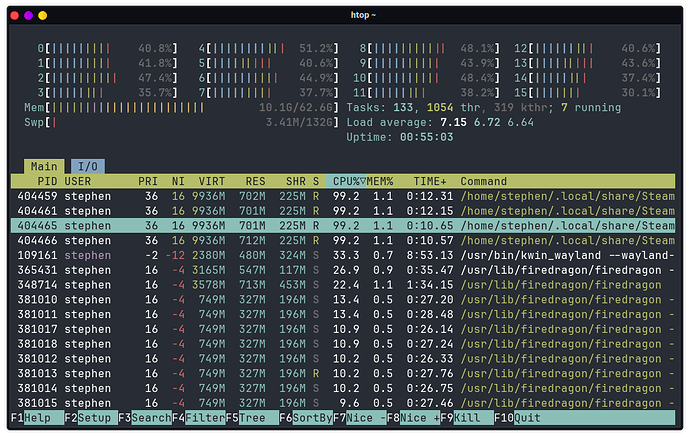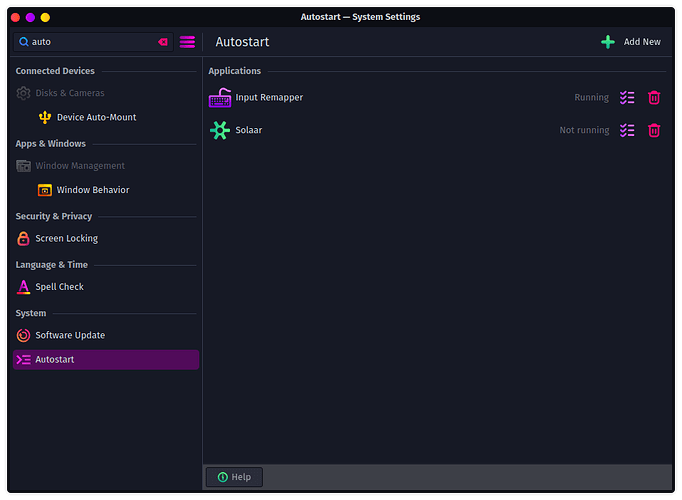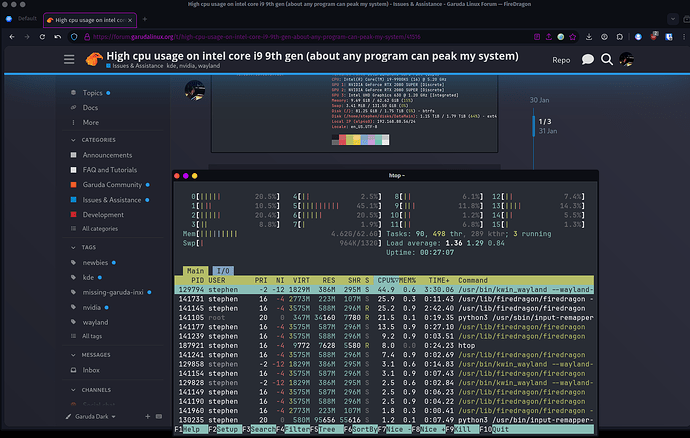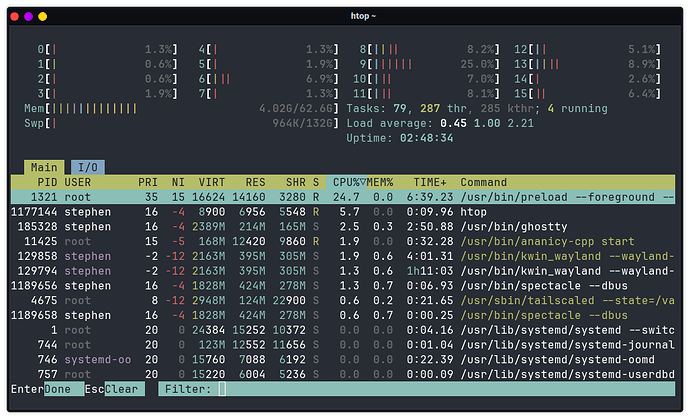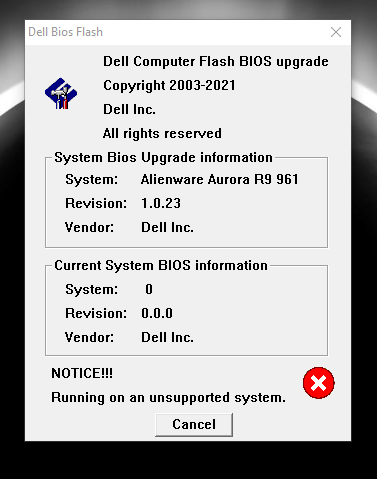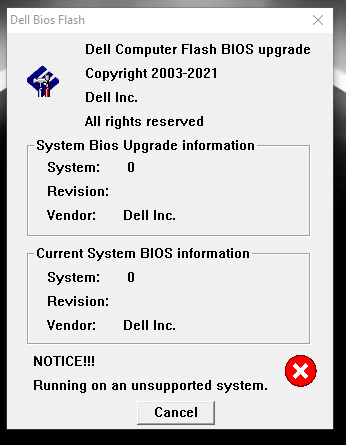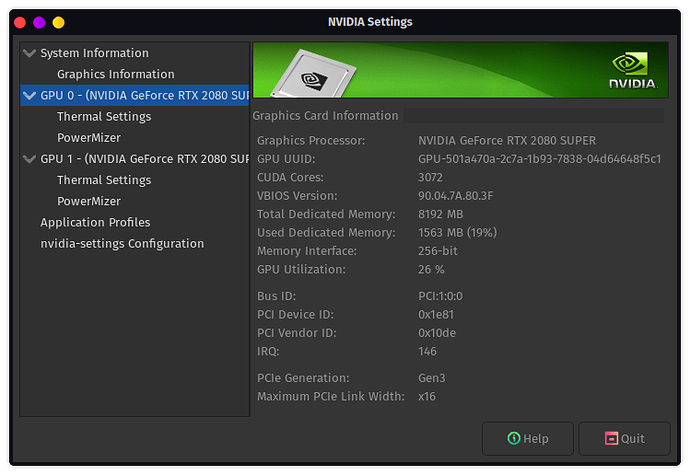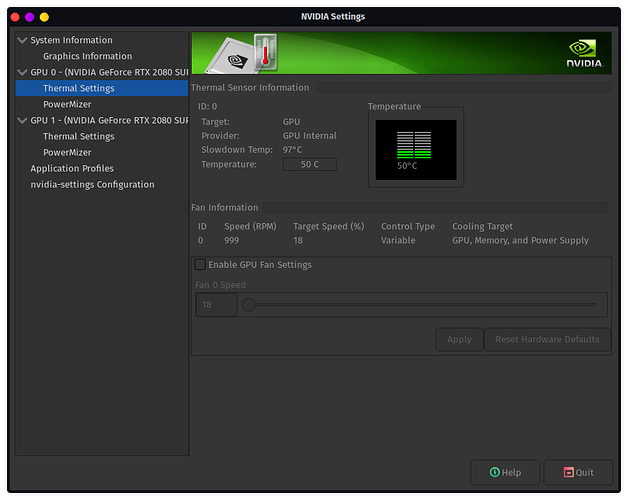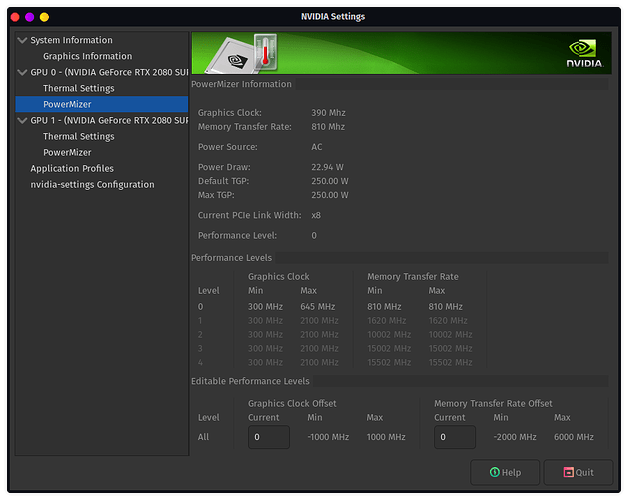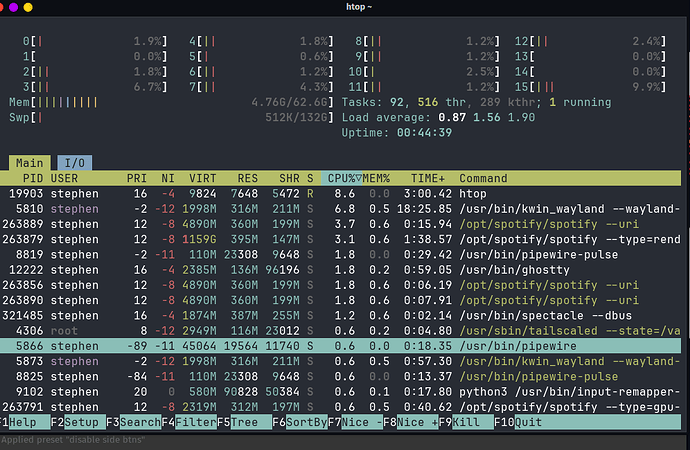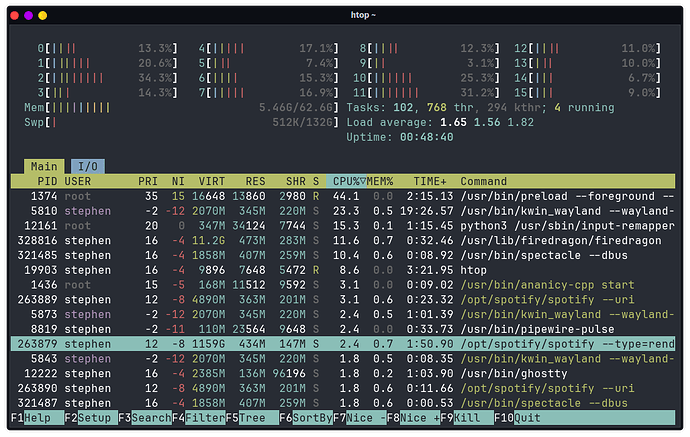Hi all,
Not sure what started this or how to begin debugging this at all as it is no single program/setting at fault. I did try X11 and Wayland, with similar issues. See my htop images below for details.
System specs:
System:
Kernel: 6.13.0-2-cachyos-bore arch: x86_64 bits: 64 compiler: gcc v: 14.2.1
clocksource: tsc avail: acpi_pm
parameters: BOOT_IMAGE=/@/boot/vmlinuz-linux-cachyos-bore
root=UUID=a840e5a0-d1a3-432e-a9a3-27dcb3be0edb rw rootflags=subvol=@
quiet rd.luks.uuid=2ced48d8-31af-4dc4-b649-ea7c98869a87
rd.luks.uuid=686e7718-1e79-4df8-bc43-86b3f9f5f883
resume=/dev/mapper/luks-686e7718-1e79-4df8-bc43-86b3f9f5f883 loglevel=3
ibt=off
Desktop: KDE Plasma v: 6.2.5 tk: Qt v: N/A wm: kwin_wayland dm: SDDM
Distro: Garuda base: Arch Linux
Machine:
Type: Desktop System: Alienware product: Alienware Aurora R9 v: 1.0.14
serial: <filter> Chassis: type: 3 serial: <filter>
Mobo: Alienware model: 0T76PD v: A01 serial: <filter> part-nu: 0961
uuid: 4c4c4544-0036-3010-8035-c4c04f483033 UEFI: Alienware v: 1.0.14
date: 09/06/2021
Battery:
ID-1: hidpp_battery_0 charge: 100% condition: N/A volts: 4.2 min: N/A
model: Logitech G703 LIGHTSPEED Wireless Gaming Mouse w/ HERO type: N/A
serial: <filter> status: full
CPU:
Info: model: Intel Core i9-9900KS socket: LGA1151 (U3E1) note: check
bits: 64 type: MT MCP arch: Coffee Lake gen: core 9 level: v3 note: check
built: 2018 process: Intel 14nm family: 6 model-id: 0x9E (158)
stepping: 0xD (13) microcode: 0x100
Topology: cpus: 1x dies: 1 clusters: 8 cores: 8 threads: 16 tpc: 2
smt: enabled cache: L1: 512 KiB desc: d-8x32 KiB; i-8x32 KiB L2: 2 MiB
desc: 8x256 KiB L3: 16 MiB desc: 1x16 MiB
Speed (MHz): avg: 4092 min/max: 800/5200 base/boost: 4000/8300 scaling:
driver: intel_pstate governor: powersave volts: 1.3 V ext-clock: 100 MHz
cores: 1: 4092 2: 4092 3: 4092 4: 4092 5: 4092 6: 4092 7: 4092 8: 4092
9: 4092 10: 4092 11: 4092 12: 4092 13: 4092 14: 4092 15: 4092 16: 4092
bogomips: 127999
Flags: avx avx2 ht lm nx pae sse sse2 sse3 sse4_1 sse4_2 ssse3 vmx
Vulnerabilities: <filter>
Graphics:
Device-1: Intel CoffeeLake-S GT2 [UHD Graphics 630] vendor: Dell
driver: i915 v: kernel arch: Gen-9.5 process: Intel 14nm built: 2016-20
ports: active: none empty: DP-7,HDMI-A-3 bus-ID: 0000:00:02.0
chip-ID: 8086:3e98 class-ID: 0380
Device-2: NVIDIA TU104 [GeForce RTX 2080 SUPER] vendor: Dell
driver: nvidia v: 570.86.16 alternate: nouveau,nvidia_drm
non-free: 550/565.xx+ status: current (as of 2025-01; EOL~2026-12-xx)
arch: Turing code: TUxxx process: TSMC 12nm FF built: 2018-2022 ports:
active: none off: DP-2 empty: DP-1,DP-3,HDMI-A-1 bus-ID: 0000:01:00.0
chip-ID: 10de:1e81 class-ID: 0300
Device-3: NVIDIA TU104 [GeForce RTX 2080 SUPER] vendor: Dell
driver: nvidia v: 570.86.16 alternate: nouveau,nvidia_drm
non-free: 550/565.xx+ status: current (as of 2025-01; EOL~2026-12-xx)
arch: Turing code: TUxxx process: TSMC 12nm FF built: 2018-2022 ports:
active: none empty: DP-4, DP-5, DP-6, HDMI-A-2 bus-ID: 0000:02:00.0
chip-ID: 10de:1e81 class-ID: 0300
Device-4: Realtek NexiGo N660P FHD Webcam driver: snd-usb-audio,uvcvideo
type: USB rev: 2.0 speed: 480 Mb/s lanes: 1 mode: 2.0 bus-ID: 1-14.4.1:10
chip-ID: 0bda:0567 class-ID: 0102 serial: <filter>
Display: unspecified server: X.Org v: 24.1.4 with: Xwayland v: 24.1.4
compositor: kwin_wayland driver: X: loaded: modesetting,nvidia
unloaded: nouveau alternate: fbdev,intel,nv,vesa dri: iris
gpu: nvidia,nvidia-nvswitch display-ID: :1 screens: 1
Screen-1: 0 s-res: 5120x1440 s-dpi: 96 s-size: 1355x381mm (53.35x15.00")
s-diag: 1408mm (55.42")
Monitor-1: DP-2 note: disabled model: Samsung LC49G95T serial: <filter>
built: 2245 res: mode: 5120x1440 hz: 120 scale: 100% (1) dpi: 109 gamma: 1.2
size: 1193x336mm (46.97x13.23") diag: 1239mm (48.8") modes: max: 3840x1080
min: 640x480
API: EGL v: 1.5 hw: drv: nvidia platforms: device: 0 drv: nvidia device: 1
drv: nvidia gbm: drv: nvidia surfaceless: drv: nvidia x11: drv: nvidia
inactive: wayland
API: OpenGL v: 4.6.0 vendor: nvidia v: 570.86.16 glx-v: 1.4
direct-render: yes renderer: NVIDIA GeForce RTX 2080 SUPER/PCIe/SSE2
memory: 7.81 GiB
API: Vulkan v: 1.4.303 layers: 5 device: 0 type: discrete-gpu name: NVIDIA
GeForce RTX 2080 SUPER driver: N/A device-ID: 10de:1e81 surfaces: xcb,xlib
device: 1 type: discrete-gpu name: NVIDIA GeForce RTX 2080 SUPER
driver: N/A device-ID: 10de:1e81 surfaces: N/A device: 2
type: integrated-gpu name: Intel UHD Graphics 630 (CFL GT2) driver: N/A
device-ID: 8086:3e98 surfaces: xcb,xlib device: 3 type: cpu name: llvmpipe
(LLVM 19.1.7 256 bits) driver: N/A device-ID: 10005:0000
surfaces: xcb,xlib
Info: Tools: api: clinfo, eglinfo, glxinfo, vulkaninfo
de: kscreen-console,kscreen-doctor gpu: nvidia-settings,nvidia-smi
wl: wayland-info x11: xdpyinfo, xprop, xrandr
Audio:
Device-1: Intel 200 Series PCH HD Audio vendor: Dell driver: snd_hda_intel
v: kernel alternate: snd_soc_avs bus-ID: 0000:00:1f.3 chip-ID: 8086:a2f0
class-ID: 0403
Device-2: NVIDIA TU104 HD Audio vendor: Dell driver: snd_hda_intel
v: kernel bus-ID: 0000:01:00.1 chip-ID: 10de:10f8 class-ID: 0403
Device-3: NVIDIA TU104 HD Audio vendor: Dell driver: snd_hda_intel
v: kernel bus-ID: 0000:02:00.1 chip-ID: 10de:10f8 class-ID: 0403
Device-4: Realtek NexiGo N660P FHD Webcam driver: snd-usb-audio,uvcvideo
type: USB rev: 2.0 speed: 480 Mb/s lanes: 1 mode: 2.0 bus-ID: 1-14.4.1:10
chip-ID: 0bda:0567 class-ID: 0102 serial: <filter>
API: ALSA v: k6.13.0-2-cachyos-bore status: kernel-api tools: N/A
Server-1: sndiod v: N/A status: off tools: aucat,midicat,sndioctl
Server-2: PipeWire v: 1.2.7 status: n/a (root, process) with:
1: pipewire-pulse status: active 2: wireplumber status: active
3: pipewire-alsa type: plugin 4: pw-jack type: plugin
tools: pactl,pw-cat,pw-cli,wpctl
Network:
Device-1: Qualcomm Atheros QCA6174 802.11ac Wireless Network Adapter
vendor: Dell driver: ath10k_pci v: kernel bus-ID: 0000:04:00.0
chip-ID: 168c:003e class-ID: 0280
IF: wlp4s0 state: up mac: <filter>
Device-2: Qualcomm Atheros Killer E2500 Gigabit Ethernet vendor: Dell
driver: alx v: kernel port: c000 bus-ID: 0000:05:00.0 chip-ID: 1969:e0b1
class-ID: 0200
IF: enp5s0 state: down mac: <filter>
IF-ID-1: tailscale0 state: unknown speed: -1 duplex: full mac: N/A
Info: services: NetworkManager, systemd-timesyncd, wpa_supplicant
Bluetooth:
Device-1: Qualcomm Atheros driver: btusb v: 0.8 type: USB rev: 2.0
speed: 12 Mb/s lanes: 1 mode: 1.1 bus-ID: 1-8:5 chip-ID: 0cf3:e007
class-ID: e001
Report: btmgmt ID: hci0 rfk-id: 0 state: down bt-service: enabled,running
rfk-block: hardware: no software: no address: <filter> bt-v: 5.0 lmp-v: 9
status: discoverable: no pairing: no
RAID:
Hardware-1: Intel SATA Controller [RAID mode] driver: intel_nvme_remap
v: N/A port: f060 bus-ID: 0000:00:17.0 chip-ID: 8086:2822 rev:
class-ID: 0104
Supported mdraid levels: raid0
Device-1: md127 maj-min: 9:127 type: mdraid level: raid-0 status: active
state: clean size: 1.82 TiB
Info: report: N/A blocks: 1953260544 chunk-size: 512k super-blocks: 1.2
Components: Online:
0: sdc maj-min: 8:32 size: 931.51 GiB state: active sync
1: sdb maj-min: 8:16 size: 931.51 GiB state: active sync
Drives:
Local Storage: total: raw: 11.37 TiB usable: 11.37 TiB
used: 1.23 TiB (10.8%)
ID-1: /dev/nvme0n1 maj-min: 259:0 vendor: Samsung model: SSD 990 PRO 2TB
size: 1.82 TiB block-size: physical: 512 B logical: 512 B tech: SSD
serial: <filter> fw-rev: 4B2QJXD7 temp: 37.9 C scheme: GPT
SMART: yes health: PASSED on: 68d 2h cycles: 257
read-units: 2,335,971 [1.19 TB] written-units: 11,039,867 [5.65 TB]
ID-2: /dev/sda maj-min: 8:0 vendor: Crucial model: CT500MX500SSD1
family: Micron Client SSDs size: 465.76 GiB block-size: physical: 512 B
logical: 512 B sata: 3.3 speed: 6.0 Gb/s tech: SSD serial: <filter>
fw-rev: 023 temp: 36 C scheme: GPT
SMART: yes state: enabled health: PASSED on: 2y 150d 21h cycles: 2431
written: 3.97 TiB
ID-3: /dev/sdb maj-min: 8:16 vendor: Smart Modular Tech.
model: SHGS31-1000GS-2 family: SATA SSDs size: 931.51 GiB block-size:
physical: 4096 B logical: 512 B sata: 3.2 speed: 6.0 Gb/s tech: SSD
serial: <filter> fw-rev: 0Q00 temp: 34 C
SMART: yes state: enabled health: PASSED on: 65d 9h cycles: 1894 Old-Age:
threshold: 1
ID-4: /dev/sdc maj-min: 8:32 vendor: Smart Modular Tech.
model: SHGS31-1000GS-2 family: SATA SSDs size: 931.51 GiB block-size:
physical: 4096 B logical: 512 B sata: 3.2 speed: 6.0 Gb/s tech: SSD
serial: <filter> fw-rev: 0Q00 temp: 28 C
SMART: yes state: enabled health: PASSED on: 1y 199d 14h cycles: 1894
Old-Age: threshold: 1
ID-5: /dev/sdd maj-min: 8:48 vendor: HGST (Hitachi) model: HUS728T8TALE6L4
family: Ultrastar HC310/320 size: 7.28 TiB block-size: physical: 4096 B
logical: 512 B type: USB rev: 3.1 spd: 5 Gb/s lanes: 1 mode: 3.2 gen-1x1
sata: 3.2 speed: 6.0 Gb/s tech: HDD rpm: 7200 serial: <filter>
fw-rev: 5006 drive-rev: V8GNW980 temp: 32 C scheme: GPT
SMART: yes state: enabled health: PASSED on: 89d 6h cycles: 5030
Partition:
ID-1: / raw-size: 1.75 TiB size: 1.75 TiB (100.00%) used: 81.25 GiB (4.5%)
fs: btrfs block-size: 4096 B dev: /dev/dm-1 maj-min: 254:1
mapped: luks-2ced48d8-31af-4dc4-b649-ea7c98869a87
ID-2: /boot/efi raw-size: 300 MiB size: 299.4 MiB (99.80%)
used: 732 KiB (0.2%) fs: vfat block-size: 512 B dev: /dev/nvme0n1p1
maj-min: 259:1
ID-3: /home raw-size: 1.75 TiB size: 1.75 TiB (100.00%)
used: 81.25 GiB (4.5%) fs: btrfs block-size: 4096 B dev: /dev/dm-1
maj-min: 254:1 mapped: luks-2ced48d8-31af-4dc4-b649-ea7c98869a87
ID-4: /var/log raw-size: 1.75 TiB size: 1.75 TiB (100.00%)
used: 81.25 GiB (4.5%) fs: btrfs block-size: 4096 B dev: /dev/dm-1
maj-min: 254:1 mapped: luks-2ced48d8-31af-4dc4-b649-ea7c98869a87
ID-5: /var/tmp raw-size: 1.75 TiB size: 1.75 TiB (100.00%)
used: 81.25 GiB (4.5%) fs: btrfs block-size: 4096 B dev: /dev/dm-1
maj-min: 254:1 mapped: luks-2ced48d8-31af-4dc4-b649-ea7c98869a87
Swap:
Kernel: swappiness: 133 (default 60) cache-pressure: 100 (default) zswap: no
ID-1: swap-1 type: partition size: 68.88 GiB used: 0 KiB (0.0%)
priority: -2 dev: /dev/dm-0 maj-min: 254:0
mapped: luks-686e7718-1e79-4df8-bc43-86b3f9f5f883
ID-2: swap-2 type: zram size: 62.62 GiB used: 3.4 MiB (0.0%) priority: 100
comp: zstd avail: lzo-rle,lzo,lz4,lz4hc,deflate,842 max-streams: 16
dev: /dev/zram0
Sensors:
System Temperatures: cpu: 69.0 C mobo: N/A
Fan Speeds (rpm): N/A
Info:
Memory: total: 64 GiB available: 62.62 GiB used: 10.44 GiB (16.7%)
Processes: 456 Power: uptime: 59m states: freeze,mem,disk suspend: deep
avail: s2idle wakeups: 0 hibernate: platform avail: shutdown, reboot,
suspend, test_resume image: 24.98 GiB services: org_kde_powerdevil,
power-profiles-daemon, upowerd Init: systemd v: 257 default: graphical
tool: systemctl
Packages: pm: pacman pkgs: 1644 libs: 451 tools: octopi,paru Compilers:
clang: 19.1.7 gcc: 14.2.1 Shell: garuda-inxi (sudo) default: Bash v: 5.2.37
running-in: ghostty inxi: 3.3.37
Garuda (2.6.26-1.1):
System install date: 2024-10-08
Last full system update: 2025-01-30
Is partially upgraded: No
Relevant software: snapper NetworkManager dracut nvidia-dkms
Windows dual boot: Yes
Failed units:
